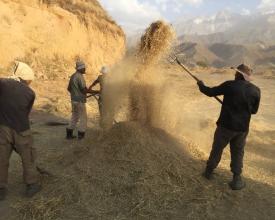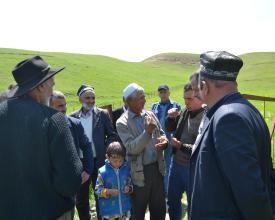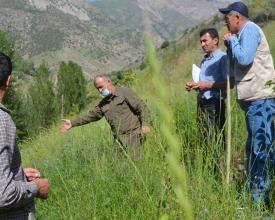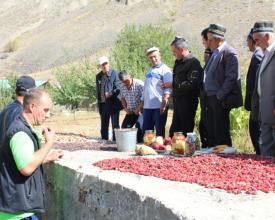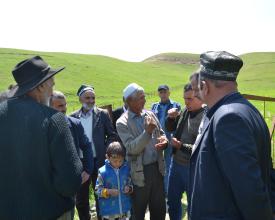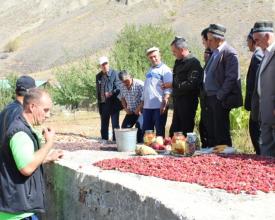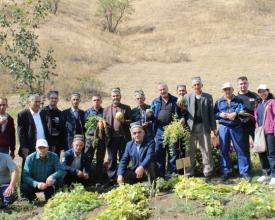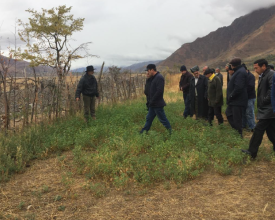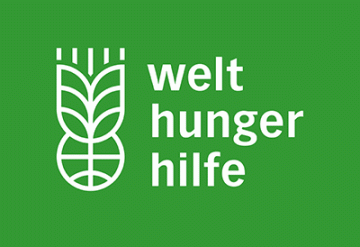
Les petits exploitants agricoles prennent les devants : Écoles d'agriculture de terrain au Tadjikistan
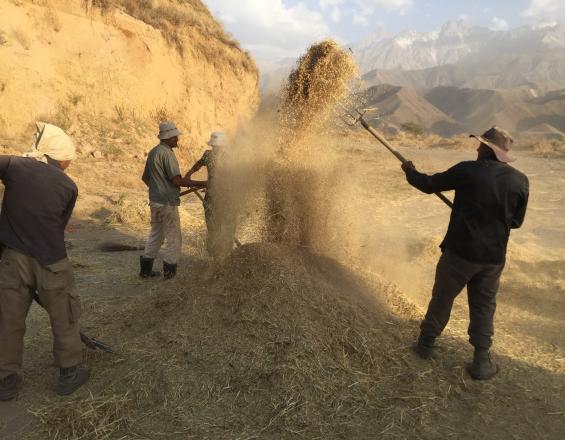
Aider les agriculteurs à mettre en œuvre des méthodes de conservation des terres et à favoriser la biodiversité par le biais d'écoles d'agriculture de terrain est une première étape importante pour relever les défis de l'agriculture tadjike. Au cours des écoles d'agriculture de terrain, les agriculteurs prennent l'initiative dans le cadre d'une approche éducative pour adultes où tout le monde se retrouve à hauteur d'yeux. Les connaissances et l'expérience des agriculteurs sont un facteur déterminant pendant les ateliers.
La Deutsche Gesellschaft für Internationale Zusammenarbeit (GIZ) GmbH et la Deutsche Welthungerhilfe (WHH), en tant que partenaire de mise en œuvre, ont organisé 37 FFS dans deux districts du Tadjikistan.
L'accent n'a pas été mis sur une culture spécifique, mais sur la diversification des cultures et des méthodes de culture. Les approches techniques ont été définies à partir d'une évaluation réalisée avant l'école et par les agriculteurs participants eux-mêmes. L'accent a été mis sur les besoins locaux et sur les bonnes pratiques en matière de gestion des pâturages, de gestion des vergers et de diversification des méthodes d'irrigation. En outre, des approches visant à réduire l'érosion des sols ont été mises en œuvre.
Contexte
Défis à relever
Le secteur agricole est l'un des secteurs les plus importants du Tadjikistan, représentant plus de 30 % du PIB et employant 70 % de la population. Outre la culture des plantes, l'élevage joue un rôle important dans le revenu des agriculteurs. Les cultures irriguées ne sont utilisées que dans quelques zones sensibles surexploitées. La monoculture, le surpâturage et l'utilisation excessive de pesticides et d'engrais mettent les écosystèmes à rude épreuve. Avec 9 771 espèces végétales, le Tadjikistan est un hotspot de biodiversité d'importance mondiale qui mérite d'être protégé.
En outre, le changement climatique aura des effets considérables. Les écosystèmes montagneux fragiles du Tadjikistan sont menacés par la probabilité accrue de phénomènes météorologiques extrêmes. L'érosion des sols et la dégradation des terres menacent la sécurité alimentaire et les revenus économiques des agriculteurs.
Emplacement
Traiter
Résumé du processus
Les écoles pratiques d'agriculture ont été mises en œuvre pour la première fois en 1989 en Indonésie par l'Organisation des Nations unies pour l'alimentation et l'agriculture (FAO) et ses partenaires. Elles ont été conçues pour apporter une réponse aux approches descendantes qui dominaient à l'époque. Depuis lors, le concept a joué un rôle important dans diverses mises en œuvre.
Dans le cadre des FFS, un groupe de 20 à 25 personnes se réunit une fois par semaine/mois sur des terrains d'entraînement. Grâce aux conseils d'un animateur, les compétences et les connaissances des agriculteurs sont améliorées. De nouvelles pratiques sont testées et validées, et une prise de décision éclairée est encouragée. Des exemples de meilleures pratiques sont présentés, mais la décision de la meilleure solution est laissée aux agriculteurs. Les FFS guident les participants à travers au moins un processus de culture afin de leur donner la possibilité de mettre en œuvre de nouvelles méthodes avec succès.
Il existe de nombreux documents sur la meilleure façon de développer et de mettre en œuvre les écoles paysannes en général. Les éléments constitutifs présenteront les aspects les plus importants qui ont été identifiés au cours des SFP qui ont été organisées au Tadjikistan par la Deutsche Gesellschaft für Internationale Zusammenarbeit (GIZ) GmbH et la Deutsche Welthungerhilfe e.V. en tant que partenaire de mise en œuvre.
Blocs de construction
Les responsables de la mise en œuvre en tant que facilitateurs
La création d'un environnement d'apprentissage adapté à l'éducation des adultes est un point crucial. L'apprentissage doit être considéré comme un processus de communication et d'échange de pensées entre adultes qui se respectent et se soutiennent mutuellement. Des contradictions se produiront à plusieurs reprises au cours de l'apprentissage par la pratique. Il est important de les relever et de les clarifier dans le cadre d'une approche ascendante. Dans un processus d'apprentissage de qualité, les agriculteurs doivent résoudre et répondre aux défis et aux questions entre eux. Cela leur permettra de s'approprier de nouveaux éléments et de s'émanciper. Ce processus permet à un groupe local d'agriculteurs d'établir la confiance, d'élargir leur connaissance de l'agroécosystème et d'apprendre les uns des autres à un niveau personnel.
Selon la théorie de Jürgen Habermas, les adultes apprennent principalement pour trois raisons : Le travail, l'interaction sociale et le pouvoir. Pour maintenir l'équilibre et initier un processus de groupe où les apprenants trouvent une motivation intrinsèque, les ateliers doivent être animés par les bons formateurs.
Les formateurs doivent faciliter plutôt qu'enseigner ou former. Ils ne doivent pas seulement posséder des compétences techniques, mais aussi faire preuve d'ouverture d'esprit et prendre l'éducation des adultes au sérieux. Pendant les ateliers, il y aura un processus d'apprentissage qui devra être adapté aux besoins changeants des participants. Cela peut conduire à une éducation des adultes pratique et participative.
Facteurs favorables
Les formateurs qui facilitent la formation par le biais de la FFS sont essentiels. Ils doivent donc
- S'adapter à l'évolution des besoins et travailler sur l'approche ascendante de l'ESF par cœur.
- Être capables de diriger un processus d'apprentissage sans prendre l'initiative d'enseigner.
- Aider le groupe à trouver un consensus et à déterminer les actions à entreprendre.
- Avoir confiance dans la philosophie qui sous-tend les techniques mises en œuvre : Produire des cultures saines dans un agro-écosystème complexe tout en respectant les ressources naturelles.
- Encadrer et aider les agriculteurs à apprendre par eux-mêmes et à utiliser les outils d'évaluation participative.
Leçon apprise
- Essayez d'éviter ou de réduire la hiérarchie dans le groupe.
- Les animateurs doivent être convaincus des techniques enseignées.
- Les animateurs doivent être impliqués dans un processus d'apprentissage et en discuter avec le groupe.
- Les paradigmes sont difficiles à changer : Le processus d'apprentissage doit être facilité par un temps suffisant et des exemples de bonnes pratiques.
Développement de matériel de formation
Afin de mener à bien les FFS, le matériel de formation utilisé par les agriculteurs doit être développé. Pour l'adapter aux besoins et à la langue locale, il doit être préparé en collaboration avec des partenaires locaux.
Selon l'approche ascendante des écoles paysannes, il est préférable de les développer de manière participative. Les besoins et les défis doivent être évalués dans la (les) région(s) du projet. En collaboration avec les partenaires locaux, le matériel de formation doit être développé de manière continue pendant que les écoles de formation professionnelle se déroulent. Cela permet d'adapter le matériel aux besoins des agriculteurs et de répondre à de légères modifications du programme.
La meilleure façon de développer le matériel est de collaborer avec les partenaires locaux. Pour faire passer les partenaires d'une approche descendante à une approche ascendante, la formation aux méthodologies d'apprentissage pour adultes permet d'acquérir de nouvelles capacités. Il convient de garder à l'esprit la contextualisation et l'adaptation locale des techniques et des méthodes afin d'obtenir des résultats de grande qualité.
Facteurs favorables
- Évaluation locale des besoins et des meilleures pratiques de manière participative.
- Impliquer les partenaires locaux et les parties prenantes.
- L'approche ascendante doit être soutenue par toutes les parties prenantes concernées.
Leçon apprise
- Le matériel de formation doit être simple et compréhensible : Les illustrations permettent de revenir facilement aux techniques et aux solutions lorsqu'on essaie de les reproduire. Des graphiques ou de courtes vidéos qui expliquent certaines techniques et méthodes peuvent être utilisés comme tutoriel pour se familiariser avec certaines techniques après la fin de l'école pratique, ce qui peut contribuer aux résultats à long terme du projet.
- Le matériel de formation doit être considéré comme complémentaire. Ce qui est montré sur le terrain est mieux mémorisé et reflété.
- Le développement continu du matériel de formation permet de réagir et de s'adapter rapidement aux demandes des participants.
Visites d'échange
Souvent, plus d'un FFS est organisé au cours d'un processus de mise en œuvre. Il est probable que les groupes développent des approches légèrement différentes pour relever des défis similaires ou qu'ils choisissent des méthodes différentes de celles qui sont pratiquées sur les terrains de formation. Les visites d'échange offrent la possibilité d'élargir les expériences et les solutions partagées.
Pendant les visites d'échange, les agriculteurs d'une école de terrain visitent un autre groupe d'agriculteurs qui se tient dans une région différente. Chacun peut tirer profit d'une expérience différente et des résultats d'un autre groupe. De cette manière, les bonnes pratiques et les réussites peuvent être partagées, et chaque groupe reçoit de nouveaux apports dans le cadre d'une approche ascendante.
Facteurs favorables
- Les écoles de formation professionnelle doivent être mises en œuvre dans plus d'une région.
- Les déplacements en groupe doivent être possibles.
Leçon apprise
- Le transfert de connaissances peut être développé à un niveau participatif.
- L'échange interrégional de connaissances peut être encouragé.
- De nouvelles solutions et de meilleures pratiques peuvent être introduites dans les écoles de formation professionnelle.
- L'expérience entre les facilitateurs et les partenaires est améliorée.
- Les agriculteurs sont plus ouverts à de nouvelles approches s'ils voient qui d'autre met en œuvre de nouvelles méthodes et que les mêmes approches sont mises en œuvre dans différentes régions. Si le projet est bien planifié, il est possible de rencontrer des modèles inspirants.
- L'échange de semences et de plants se fait facilement lors des visites d'échange.
Aspects importants de la FFS
Les écoles pratiques d'agriculture ont fait leurs preuves dans le monde entier. Elles réunissent des aspects de l'agroécologie, des méthodes d'apprentissage pour adultes et du développement communautaire et sont largement adaptées par les ONG, les gouvernements et les agences internationales. Dans l'ensemble, certains aspects doivent être pris en compte pour obtenir des résultats positifs :
- Processus d'apprentissage progressif : Changer les processus et les mentalités nécessite du temps et suffisamment d'espace au sein des ateliers. Les problèmes surviennent en temps réel et les bonnes solutions doivent être mises en pratique. Cela permet à chacun de faire l'expérience de résultats positifs et de changer de perspective. Le fait de voir quelque chose de nouveau fonctionner avec succès déclenche généralement un processus de réflexion ouvert.
- Les agriculteurs doivent prendre l'initiative et définir le programme.
- Le processus d'apprentissage doit être structuré et orienté vers la pratique, avec des réunions régulières.
- Les formateurs doivent faciliter les choses plutôt qu'enseigner : L'éducation des adultes doit être prise à cœur et soutenue par des facilitateurs.
- Des processus de groupe doivent être mis en place. Par conséquent, la formation doit se concentrer sur
- Le travail de groupe pratique avec des exercices sur le terrain
- les compétences critiques et analytiques
- les compétences en matière de planification
- Compétences en matière d'évaluation et de retour d'information
- Approche situationnelle et adaptée localement pendant les ateliers.
- Des terrains de formation adaptés doivent être disponibles.
Facteurs favorables
- Les facilitateurs solides qui ont besoin de soutenir l'éducation des adultes de manière participative ont le cœur sur la main. Une formation complémentaire peut contribuer à un résultat positif.
- Des participants engagés et ouverts d'esprit.
- L'animateur doit non seulement être bien formé techniquement, mais aussi être convaincu des méthodes présentées.
Leçon apprise
- Il est important de maintenir un taux de participation élevé des mêmes agriculteurs pendant toute la durée des ateliers. Cela favorise le processus d'apprentissage progressif et l'acceptation.
- Les animateurs/techniciens doivent être impliqués dans le processus d'apprentissage et en discuter avec le groupe.
- La formation des animateurs à l'éducation des adultes favorise le processus d'apprentissage.
- La sélection de chefs de groupe parmi les participants contribue à l'animation des ateliers. Il est utile de les impliquer à un niveau élevé.
- La formation doit avoir lieu sur le terrain. La flexibilité des horaires permet de proposer des formations même lorsque les conditions météorologiques changent.
- L'octroi de petites incitations ou de "cadeaux" qui soutiennent le travail (par exemple, un pot de conserve) favorise l'acceptation générale de l'école paysanne et des nouvelles approches.
Impacts
Au cours de ces ateliers, plus de 700 agriculteurs (57% de femmes) ont participé à 6 sessions thématiques et à 2 sessions d'évaluation. Les ateliers ont été répartis sur une saison de culture afin d'apporter un soutien du semis à la récolte et à la préparation de la saison suivante.
Impacts sur la vie des agriculteurs
- Diversification de l'alimentation des ménages
- Diminution du risque d'échec total de la récolte
- Amélioration de la sécurité alimentaire
- Amélioration des capacités (par exemple, techniques de préparation) et des compétences en matière de résolution de problèmes
- Augmentation de l'autonomie
Impacts sur la biodiversité
- Changement de comportement des agriculteurs vis-à-vis des ressources naturelles
- Nouveaux habitats créés (clôtures vivantes, plantation d'arbres comme brise-vent)
- Augmentation de la variété des cultures et réintroduction de cultures traditionnelles et locales
- Production et application d'engrais organiques
- Utilisation de cultures intercalaires
- Les agriculteurs conservent et partagent les semences locales dans des banques de semences.
Résistance au changement climatique
- Conception correcte des courbes de niveau et labourage en courbes de niveau
- Techniques de labourage sans ou avec peu de travail du sol
- Gestion de l'eau (amélioration de l'irrigation des sillons et de la collecte de l'eau)
- Réensemencement des pâturages alimentés par la pluie
Impacts sociaux
- Renforcement de la collaboration locale et de la communauté
- Renforcement des connaissances locales
- Échange d'informations entre agriculteurs vivant dans des régions différentes
Bénéficiaires
Les principaux bénéficiaires sont les agriculteurs et leurs familles des districts d'Ayni et de Rasht au Tadjikistan, ainsi que les communautés dans lesquelles ils vivent.
En outre, les formateurs et les ONG coopérantes ont renforcé leurs capacités grâce aux formations dispensées.
Objectifs de développement durable
Histoire
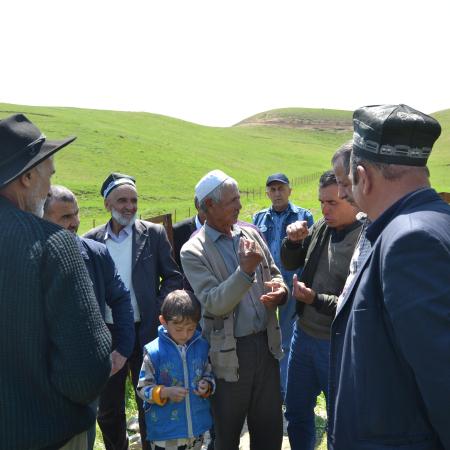
Nous aimerions présenter une histoire ici. En raison du projet COVID-19, il n'est malheureusement pas possible d'effectuer des visites sur le terrain. Si des réunions plus longues sont possibles avant la fin du projet, nous publierons un article ici plus tard. En attendant, nous vous invitons à consulter d'autres histoires et solutions issues du projet :
- https://panorama.solutions/en/solution/resilient-orchards
- https://panorama.solutions/en/solution/integrative-forest-management
- https://panorama.solutions/en/solution/sustainable-pasture-management-improving-grassland-ecosystems-and-livelihoods-0
- https://panorama.solutions/en/solution/diversified-kitchen-gardens
- https://panorama.solutions/en/solution/sustainably-managed-irrigated-annual-crops
